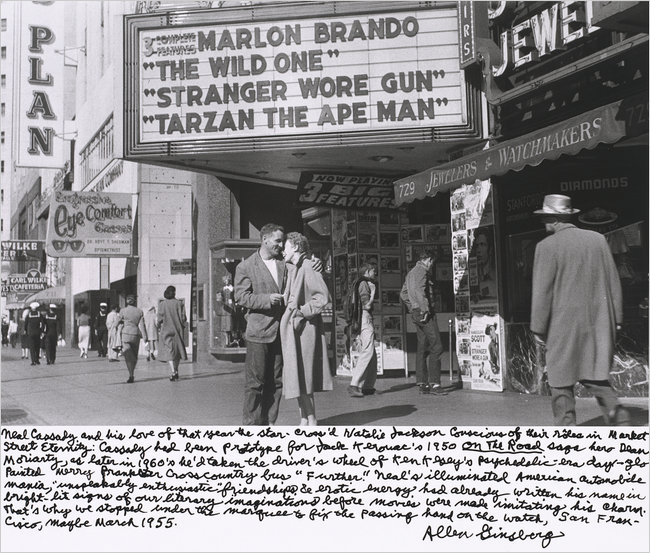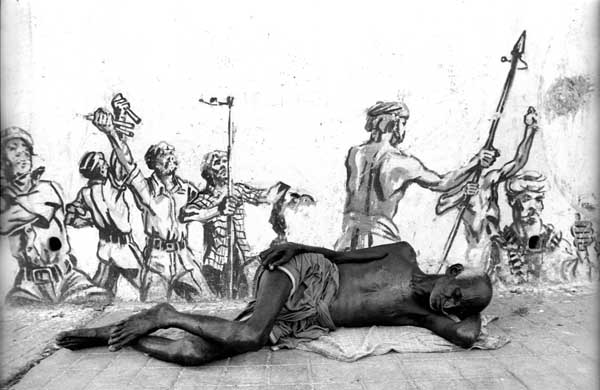
I am the rage I am the storm
My path I leave barren and shorn
Swaying in my crazy dance
I rejoice at all I face
Move at my own pace
I grapple my foe
I wrestle to die
I am the warrior, head held high*
He was a dreamer, a rebel, a lover, a poet. He moved strong men to tears and woke a nation to unite against tyranny. The British imprisoned him only to find his pen spewing venom from the prison cell. Yet, Kazi Nazrul Islam was a romantic, and his lilting songs, magical stories and even his fiery verse did more to bring together Muslims and Hindus than any peacemaker had ever done. The poor turned away from God?s door, the lover spurned, the weak, the meek, the downtrodden, all found refuge in his words and his music. Unlike the literary giant of the time – Tagore, Nazrul was uncompromising. He spoke of strife, and the peace of acquiescence was never his mettle. Mixing Persian, English and Hindi with his majestic repertoire in his native language Bangla, Nazrul called a nation to war against its occupiers, but also spoke out against the tyranny of religion and class. It was his haunting love songs however, that made Nazrul inimitable. Living the life he preached, he refused to conform. Marrying outside religion, shunning material comfort, and eventually rejecting our carefully defined sanity, he rebelled against a peace that required the acceptance of the status quo. Conflict was his muse.
Lalon, long before him, had traversed a very different terrain. The journey between the body and the soul. The metaphors of the bird and the cage, with the soul flirting with the body, elusive. tantalizing and ever so ephemeral. The sufi saint dealt with the conflict between the material world and the spiritual realm. But for Bangladeshis it wasn?t Tagore or Lalon or even Nazrul, but the struggle for language itself that galvanized the nation. Separated from India on the basis of religion when the British were forced to leave, East Pakistanis had always felt exploited by the West wing and discontent had been brewing, but it was when Jinnah declared that Urdu would be the national language of Pakistan that people took to the streets. The violent birth of Bangladesh, gave a nation with its own language, but Bangali nationalism too became the oppressor of other cultures and the indigenous people of the Hill Tracts have been brutally reminded ever since that they are the other. Their peace could only be earned at the cost of their identity.
Surendra Lal Dewan, was sad that his song had been stolen by the president, but that was not what pained him most. As director of the Tribal Centre in Rangamati, he was required to bring out Pahari women dressed in ethnic garb at regular intervals. They would dance in bright tribal costumes for tourists, visiting dignitaries and even curious Bangalis whenever the state needed to demonstrate Bangladesh?s tolerance and its ethnic diversity. In his song Dewan had spoken of a Bangladesh free of oppression and torture. That a military general, claiming the song to be his own, would use the same words to chant of an egalitarian Bangladesh pierced Surendra with his own words.
Even the naked halogen lamp that shone on the creaky planks that made up the stage near Ispahani Gate 1 had gone. It was the port town of Chittagong and there was no electricity. It didn?t affect Mustafa Kamal and the UTSA theatre group. A string of candles lit up the actors. The children came up close. Kamal wasn?t involved in national issues. He and his group performed to children and their parents, in the slums around Gate 1, and in many other parts of the country. The plays would talk of HIV/AIDS, dowry and land rights. The team would go out to villages and settle land disputes, or fights over someone?s loss of face, by getting the villagers to enact their strife in public. Their participatory plays used humour, love and the occasional risqu? dialogue to enthrall a rapt audience who found a momentary outlet from their tortured lives. But the plays were not simply about temporary relief. They introduced strategies for dealing with the tensions that built up between the landed and the landless, between the buyer and the seller, but also between friends, relatives and neighours. Kamal understood that conflict was a natural product of relationships. While controversies and grievances resulting from differences in values, competition for resources, or perceived threats, often result in conflict, its mitigation rarely depends entirely upon the solution of the problem, but might only require a release through rituals of protest.
Artificial barriers between nations, illegal occupation of lands, the struggle between the worker and the employer, the exploitation of women and children, and the suppression of minorities generate sparks that might set ablaze communities, and the fires needed to be doused. But there was more to art than being the key to the cage. Kamal worried that while his art might allay the tension, it might, through appeasement – like the empty rhetoric of politicians, like the opium fed to the hungry child, like the comfort assured in afterlife, like the promises of peace by generals – help perpetuate the greater wrong.
Shahidul Alam
Los Angeles
24th May 2007
* Translated and adapted from the poem ?The Rebel? by Kazi Nazrul Islam
Abridged from an essay written for the Prince Claus Fund for the 2007 Award Book on the theme ?Culture and Conflict?.
Kazi Nazrul Islam (b. May 25, 1899 ? d. August 29, 1976 ) was a Bengali poet, musician, revolutionary and philosopher who is best known for pioneering works of Bengali poetry. He is popularly known as the Bidrohi Kobi ? Rebel Poet ? as many of his works showcase an intense rebellion against oppression of humans through slavery, hatred and tradition. He is officially recognised as the national poet of Bangladesh and commemorated in India.
The birth date of Kazi Nazrul Islam, originally recorded on the basis of the Bangla calendar, is considered by some to be the 24th May 1899.


 Slide Show
Slide Show